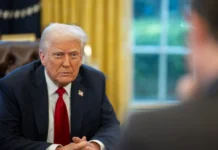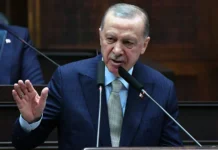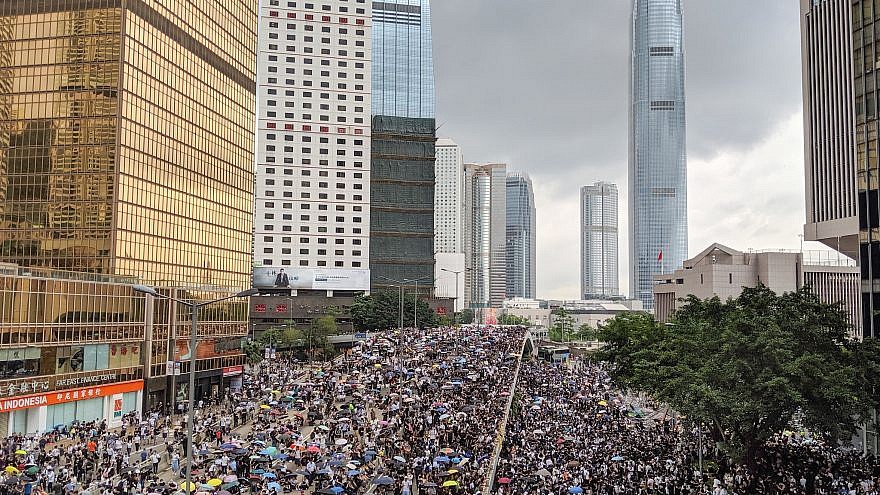It’s more than 30 years since pro-democracy student demonstrators were brutally crushed by Chinese security forces in Beijing’s Tiananmen Square—a graphic sign that while communism was in the process of collapsing elsewhere in the world, China was to be a bloody exception.
The spirit of those 1989 protests has been revived in recent weeks on the streets of Hong Kong, where hundreds of thousands of protesters have been vigorously opposing Chinese attempts to impose the draconian laws that hold sway on the mainland.
Because Hong Kong was a British possession for 150 years, it has a special status. When, in 1997, Britain handed possession of Hong Kong back to China, it did so on the basis that the territory would be governed under the principle of “one country, two systems,” essentially preserving for Hong Kong the democratic practices and institutions forbidden on the Chinese mainland, where the Communist Party continues to maintain one-party rule.
But those democratic institutions have been steadily eroding. Hong Kong’s leader, the chief executive, is currently elected by a 1,200-member election committee—a pro-Beijing body chosen by just 6 percent of eligible voters. China has also been successful in barring some elected pro-democracy politicians from taking their seats in the 70-member Legislative Council, at the same time as boosting that council’s pro-Beijing orientation.
The current spate of protests was triggered by a now-withdrawn legislative measure that would have allowed the extradition of Hong Kong residents to mainland China. Having defeated that proposal, the protest movement is now seeking broader democratic reform—and many activists openly say that they identify as Hong Kongers rather than Chinese, and that they want independence outright.
Even without the direct intervention of Beijing, the response of the Hong Kong authorities to the protests has been shameful. Peaceful demonstrators have been gassed and beaten by armed police officers, in some cases aided by criminals associated with the Chinese Triad gang network. The prospect remains that Chinese forces will invade and directly occupy Hong Kong if the protests continue. And hanging over it all, like a Sword of Damocles, is the year 2047—the year that Hong Kong’s Basic Law guaranteeing its autonomy from China expires, after which no one knows what will happen.
Why should the Jewish community care particularly about these protests? There are many good reasons, not least the tradition of humanitarianism and human-rights activism among American Jews. But what should pick at our consciences above all is the kind of society that China has now become, exactly 70 years after the Communist Party took power—a society created from a legacy of mass murder.
In terms of sheer numbers exterminated, the record of Chinese communism is worse than even the Soviet Union or Nazi Germany. Upwards of 60 million people perished under chairman Mao Zedong’s regime in concentration camps and prisons, or starved by the famines imposed by the Communists upon the peasantry. While Chinese communism has had its share of factional struggles since Mao’s death in 1976, the same Communist Party remains in power now, carrying out the same abuses. Over the last year, up to 1.5 million members of the Muslim Uighur minority in northwestern China have been herded into “re-education camps.” Thousands of miles away, in Hong Kong, protestors have a credible fear that a similar fate awaits them.
That fear was eloquently summarized by one Hong Kong protester in an open letter to the people of China, circulated during the last week by Chinese pro-democracy activists to journalists in the U.S. “Hong Kong’s silent majority and many people of conscience have gradually understood the tactics of the totalitarian government,” the protester explained. “They understand that the rule of law, democracy and freedom are just the lies the rulers use to take control of power. A totalitarian government only knows how to use lies, fears and violence to control the society and maintain order. This is also why the people of Hong Kong continue their uprisings in every district of the city. Our enemy has never been China, nor our compatriots in the mainland, but the totalitarian government.”
Sadly, over the years the pro-democracy movement in Hong Kong and China has been treated shabbily by the democratic nations of the world, not least the United States. The movement has held regular protests that require participants to show enormous courage given the riot police tactics used against them—the last time Hong Kong was convulsed with major demonstrations, in 2014, the protesters signed off by saying, “We’ll be back.”
But when President Barack Obama visited Beijing in 2016, the issue of human rights was noticeably absent from his agenda. Under U.S. President Donald Trump, rising tensions with China have centered on trade and, to a lesser extent, military spending; as with Obama, human rights don’t even make the appendix. With regard to the Hong Kong protests, Trump’s contribution has been to advise Chinese President Xi Jinping to go there and meet with the demonstrators in person; were any such meeting to take place, past practice suggests that it would be followed up with mass arrests, as enough advisers to the current U.S. administration know all too well.
Ultimately, China’s rulers know that their penetration of the global economy has been so extensive that Western nations—not just the United States, but the United Kingdom, the European Union, Australia, Israel and Canada, among others—will be driven by pragmatism. That approach will, if anything, be reinforced by, firstly, the need to preserve trade and, secondly, uncertainty about China’s regional intentions.
What that means, potentially, is that Hong Kong is expendable. As we look back at episodes in our own history when Jews were similarly disregarded in the wider calculations of power politics, the present is as good a time as any to tell the American president that the future peace of the world may, just may, be hanging on the shoulders of those brave folks in Hong Kong.


























